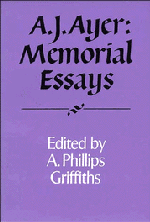Book contents
- Frontmatter
- Contents
- Preface
- A Defence of Empiricism
- Ayer: the Man, the Philosopher, the Teacher
- Ayer's Place in the History of Philosophy
- AYER'S ATTACK ON METAPHYSICS
- Ayer and World Views
- Language, Newspeak and Logic
- On the relation between Common Sense, Science and Metaphysics
- Logical Positivism and Intentionality
- Probability and the Evidence of our Senses
- Seeing Qualia and Positing the World
- Three Varieties of Knowledge
- The Importance of ‘If’
- Ayer's Ethical Theory: Emotivism or Subjectivism?
- Subjectivism and Toleration
- An Interview with A. J. Ayer
- Notes on Contributors
- References
- Index
Logical Positivism and Intentionality
Published online by Cambridge University Press: 01 July 2010
- Frontmatter
- Contents
- Preface
- A Defence of Empiricism
- Ayer: the Man, the Philosopher, the Teacher
- Ayer's Place in the History of Philosophy
- AYER'S ATTACK ON METAPHYSICS
- Ayer and World Views
- Language, Newspeak and Logic
- On the relation between Common Sense, Science and Metaphysics
- Logical Positivism and Intentionality
- Probability and the Evidence of our Senses
- Seeing Qualia and Positing the World
- Three Varieties of Knowledge
- The Importance of ‘If’
- Ayer's Ethical Theory: Emotivism or Subjectivism?
- Subjectivism and Toleration
- An Interview with A. J. Ayer
- Notes on Contributors
- References
- Index
Summary
When ‘Freddy’ Ayer asked me to contribute to his volume in the Library of Living Philosophers series (which, regrettably, has still not been published), I was delighted, and while the main topic of my contribution was the sense (if any) in which it can be a ‘necessary’ truth that water is H2O, I devoted a section of that essay to problems that I saw with Ayer's account of the paradigm intentional notion, the notion of reference. Ayer ended his reply by saying that he could not satisfactorily meet my objections, and with characteristic modesty and good humour he added that it was only small consolation that, in his opinion, no one else could satisfactorily account for reference either. The thoughtfulness, fairness, and responsiveness of Ayer's entire reply reminded me of the way in which the same qualities were displayed in Carnap's reply to my contribution to his volume in the same series. These two replies—Carnap's and Ayer's—display the virtues of the philosopher who searches for truth, and who genuinely welcomes serious criticism, in a truly exemplary way. I treasure both of them, and they are bound up with my memories of those two wonderful philosophers.
In today's lecture, I shall not review the difficulties I laid out in ‘Is Water Necessarily H2O’, because those difficulties had to do with Ayer's own account of reference to mental particulars, an account which is closer to Russell's than it is to the main doctrines of logical positivism. Instead, I shall consider the treatment of intentional notions by the two principal leaders of the movement, namely, Carnap and Reichenbach.
- Type
- Chapter
- Information
- A. J. Ayer: Memorial Essays , pp. 105 - 116Publisher: Cambridge University PressPrint publication year: 1992
- 1
- Cited by



